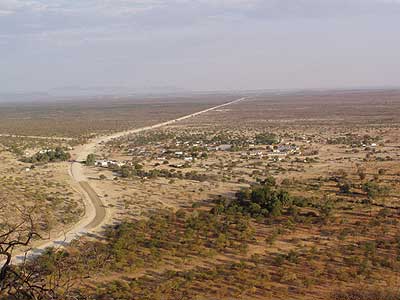Demographic, economic and social transformations in a Namibian multiethnic
region
 Fransfontein community, Kunene South, Central Namibia Fransfontein community, Kunene South, Central Namibia
|
SUMMARY OF THE PROJECT
The project describes and explains the demographic history and present of
the Namibian community Fransfontein and its rural and semiurban surroundings.
Special attention is paid to the interplay between historical processes, cultural
dynamics and demographic transformations. For analytical purposes, it is helpful
to differentiate the area into three social arenas, i.e. Fransfontein community
itself, more than 30 communal and commercial settlements surrounding Fransfontein,
and the town of Khorixas. Although these social settings are connected through
dense and multidimensional social ties, e.g. based on migration or kinship,
each of them has a distinct character. These settings form the base for three
detailed ethnographic case studies undertaken within the project. Under a common
cultural demographic framework each case study focuses on different aspects
of the demographic and cultural dynamics of the region.
- Julia Pauli’s study, conducted jointly and in equal parts with
Michael Schnegg (cf. project C1), is the broadest in scope, using a diverse
range of
data (e.g. archival records, life histories, ethnographic census and survey
data, visual data, genealogical data and network data) to reconstruct and understand
the demographic and cultural history and present of the Damara and Nama of
Fransfontein and its surrounding communal and commercial farms. Julia Pauli
focuses foremost on the historical emergence and transformation of kinship,
especially marriage and other forms of partnership, combing systematic demographic
data with new kinship theories, most prominent the concept of relatedness.
A detailed description of Michael Schnegg’s research can be found under
C1.
- Clemens Greiner’s aim is to understand the economic and social
situation of several of Fransfontein’s surrounding settlements that
are mainly inhabited by Otjiherero or (to a lesser extent) Oshiwambo speaking
people.
Historical and contemporary migration processes are central to his study.
All settlements researched by Greiner are a result of forced colonial migration.
These historical demographic antecedents are extended up to the present.
Today,
migration plays a prominent role in the local economy, e.g. in the form of
remittances.
- In her Khorixas research, Martina Gockel tackles the multiple
connections between demography and culture by analysing fertility decision-making
in great
detail. Namibian fertility decision-making is undergoing fundamental
changes, not only due to a general reduction in fertility, but even more
so because
of fears of HIV infections.

